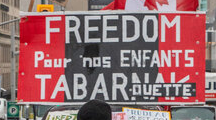Tabar(nak|ouette)
« previous post | next post »
From "As deadlock eases in Windsor, Ottawa remains a scene of paralysis", NYT 2/13/2022:
The sign at the center of the photo:

The underlying text:
FREEDOM
Pour nos ENFANTS
TABARNAK
FREEDOM
For our CHILDREN
GODDAMMIT
…where the bottom line is glossed by Wiktionary as
(Quebec, vulgar, slang) An expletive and intensifier for all purposes.
and obviously the source is religious ("Originally a Quebec eye-dialect spelling of tabernacle") rather than sexual.
The supplied quotation uses fuckin' as the English equivalent:
2009, Robert Maltais, Le Curé du Mile End, page 195:
Non, non, c'est juste une joke. Garde-lé, ton vingt piastres. C't'une tabarnak de gang de fous: j'ai les poches pleines. M'a te dire rien qu'une affaire: tu l'as en tabarnak ! Non, non, c'est vrai. T'es correct, toé.
No, no, I was just joking. Keep it, your twenty bucks. They're all a fuckin' bunch of idiots: my pockets are full. Lemme tell ya something: you fuckin' have it! No, no, it's true: you're quite good, you.
So maybe the translation should be something like "Freedom for our fuckin' children", or "Freedom for our children for fuck's sake"?
Anyhow, the sign-maker attenuated the message a bit by overlaying -ouette on -nak, producing taberouette.
…from whose Wiktionary entry I learned the phrase "minced oath", which somehow escaped my linguistic experience until today…
The overlay is sort of like partly overlaying -shdarnit on the last seven letters of goddammit, to produce GOshdarnit (while leaving the unminced spelling clear to the eye.)
Update — see also "Oh tabernacle! What the wafer!", 12/5/2006; "More about cussing in Quebec", 12/6/2006.

Alex said,
February 13, 2022 @ 4:37 pm
On French language tv in Quebec, you can say "fuck" as in "c'est fucké" because it's not considered as profane in French. (https://www.theguardian.com/science/2017/nov/09/baise-moi-canada-decides-that-the-french-f-word-is-not-taboo-for-listeners-ears).
However, you still can't say tabarnak until 9pm. (https://www.cbsc.ca/cbsc-decisions/page/chot-dt-re-la-voix#_ednref)
Jonathan Lundell said,
February 13, 2022 @ 5:23 pm
I learned “minced oath” not all that long ago, in the context of a podcast (McWhorter’s?) in which they were the subject. It’s a fascinating topic. We do recognize the more common “mince words”.
Scanning the OED entry for mince (v), I notice an especially specific meaning, “To carve (a plover)”. It and its cousins have a forced feeling to them, reminiscent of terms of venery.
martin schwartz said,
February 13, 2022 @ 5:51 pm
Calice! ('Chalice!" as a French-Canadian cussword goes with Tabarnac!
Martin Schwartz
Geoff said,
February 13, 2022 @ 10:12 pm
The form used in the quotation, "en tabarnak", is a little bit different. It usually signifies something like the English "… as fuck". It's a bit hard to render that sense felicitously within the syntax of that specific quote, unless you say e.g. "You have a fuckton/shitload of it."
Geoff said,
February 13, 2022 @ 10:14 pm
Per Alex's comment, I can confirm that broken doorbells in my neighbourhood routinely bear handwritten notes reading "sonette fuckée" without any hint of vulgarity.
Circeus said,
February 14, 2022 @ 8:42 am
Worth noting that "tabarnak" is considered the single worst expletive in Quebec French. The -barouette mince is one of the most amusing, because it melds into it the French word for "wheelbarrow".
Robert Coren said,
February 14, 2022 @ 10:32 am
This triggered a childhood memory of a detail from Maurice Herzog's Annapurna (an account of the first summiting of the eponymous mountain, by French climbers in 1950): Early on (before the start of the expedition), Herzog received a letter from one of his colleagues who is vacationing in Quebec , in which the colleague reports learning new "swear words", and gives as an example "skiing en tabernacle", which, in the English translation I read, is interpreted as "skiing like hell". I don't what Herzog's French equivalent was, but I suppose that in no case would a 1950s publisher have sanctioned the use of any "fuck" derivative in this context.
[Note to readers of that other thread: I'm using "sanction" in the "approval" sense here.]
Coby said,
February 14, 2022 @ 12:31 pm
What I find interesting is the change of the second syllable from -ber- to -bar-. I didn't notice this feature in Quebec French during my brief stay there, but it's normal in Cajun French (which stems from that of the Maritimes, not Quebec): cher sounds like char.
David C. said,
February 14, 2022 @ 9:38 pm
Another (somewhat dated) Quebec minced oath is Cinq, six boîtes de tomates vartes (literally, five six boxes of green tomatoes) for saint ciboire de tabarnak (literally, holy ciborium of tabernacle).
On a side note, given the general indifference to Canadian nationalism in Quebec, I am somewhat surprised by the significant presence of French and Francophones in the protests of the past two weeks, which have taken place in a sea of Canadian flags.